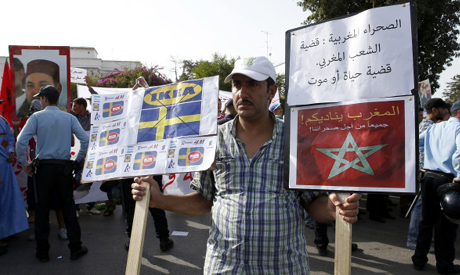
FILE - In this Oct.4, 2015 file photo, a man holds a placard with Swedish companies and flags with legend in Arabic reading "The Moroccan Sahara is Moroccan case a matter of life or death", as some thousands of Moroccans protest outside the Swedish Embassy in Rabat, Morocco. (AP Photo, File)
Morocco is reacting aggressively to any challenges to its claims on Western Sahara, as it marks 40 years since taking control of the mineral-rich territory. Among apparent targets of its wrath: Swedish icons IKEA, Volvo and H&M.
This month, the Moroccan government announced it would consider boycotting Swedish products and companies over reports that Sweden was planning to recognize the independence of the Saharawi Arab Democratic Republic, or SADR, which disputes sovereignty over Western Sahara with Morocco. Some 60 countries consider it an independent state, but no Western nation does. Morocco has been stuck in a frozen conflict for years with the Polisario Front, the Algeria-backed insurgency that proclaimed SADR.
Brands associated with Sweden have faced difficulties in Morocco in recent weeks: The country's first IKEA store was blocked from opening last month over administrative problems. Employees were mysteriously unable to enter a Volvo dealership.
Thousands of Moroccans from labor unions and non-governmental groups marched in front of the Swedish Embassy in support of the possible boycott — some distributing brochures showing the logo of companies such as Swedish retailer H&M crossed out with a bold red "x."
"This is the Moroccan people's decision, not the Moroccan government's," said Mohamed Yacoubi from the Moroccan Center for Human Rights, who participated in the protest.
Sweden will undergo a review of its policy toward the Western Sahara, due to be completed in February. But so far, "there has been no dramatic development in Sweden," said Jens Orback, a former Social Democratic Cabinet member and current head of the Olof Palme International Center, a human rights group linked to Sweden's governing Social Democrats.
While in the opposition, the Social Democrats called for Sweden to recognize the Western Sahara as an independent state, but now that they are in government, they appear more cautious. "The experience from (Sweden's) recognition of Palestine have made them realize that they will get a lot of criticism," Orback said.
Meanwhile, Morocco sent a delegation to Sweden comprised of leaders of leftist parties, with Nabila Mounib, Secretary General of the United Socialist Party, at its head.
Upon her return, Mounib said that "Sweden does not understand Morocco's anxieties." She said she had the impression, however, that Sweden doesn't plan to recognize SADR independence.
The Sweden flap is one of several signs of tension ahead of the 40th anniversary of the Western Saharan conflict next month, which the Moroccan government is marking with speeches and royal visits.
Morocco annexed the mineral-rich former Spanish colony in 1975 and fought the Polisario Front until the U.N. brokered a cease-fire in 1991. The territory on the Atlantic Coast is home to the U.N.'s longest-running peacekeeping mission — and its only mission without a mandate to monitor human rights.
Human rights groups say Morocco uses violence to stifle dissent, while the government insists U.N. monitoring is only needed when there are major violations. The issue erupted into a diplomatic dispute with the U.S. in 2013.
The Moroccan government recently urged Human Rights Watch to suspend its activities in Morocco pending a meeting between government representatives and the group's executive director, Kenneth Roth.
Human Rights Watch says it responded and proposed meeting dates, with no response.
Then in early October, the Wall Street Journal carried a full-page appeal by Communications Minister Mustapha Khalfi to Roth describing the group's activities in Morocco as biased.
"We don't understand what motivates this surprisingly aggressive letter," said Ahmed Benchemsi, Human Rights Watch's Advocacy and Communications Director, for its Middle East and North Africa Division.
The group says it's especially surprised by the new pressure because in August it publicly praised the Moroccan government's approval of the Sahrawi Association of Victims of Human Rights Abuses Committed by the Moroccan State.
Diplomatic tensions around Western Sahara often manifest themselves indirectly.
The troubles with IKEA, for example, erupted just before it was scheduled to open Sept. 29. Morocco's Interior Ministry said its opening was blocked because it lacked a proper "certificate of conformity." But the move came amid Internet rumors about Sweden's potential recognition of the Western Sahara. While IKEA is now based in the Netherlands, its founder and public image are resolutely Swedish.
Soon afterward, the government said it was considering a boycott of Swedish goods. Around the same time, authorities reportedly blocked employees from entering a Casablanca Volvo dealership, operated by a private importer.
"We are not affected by the discussed boycott in Morocco," Volvo Cars said in a statement. "The incident in Casablanca relates to an issue around the ownership and rent of the dealership facility, it has nothing to do with the political debate."
Short link: